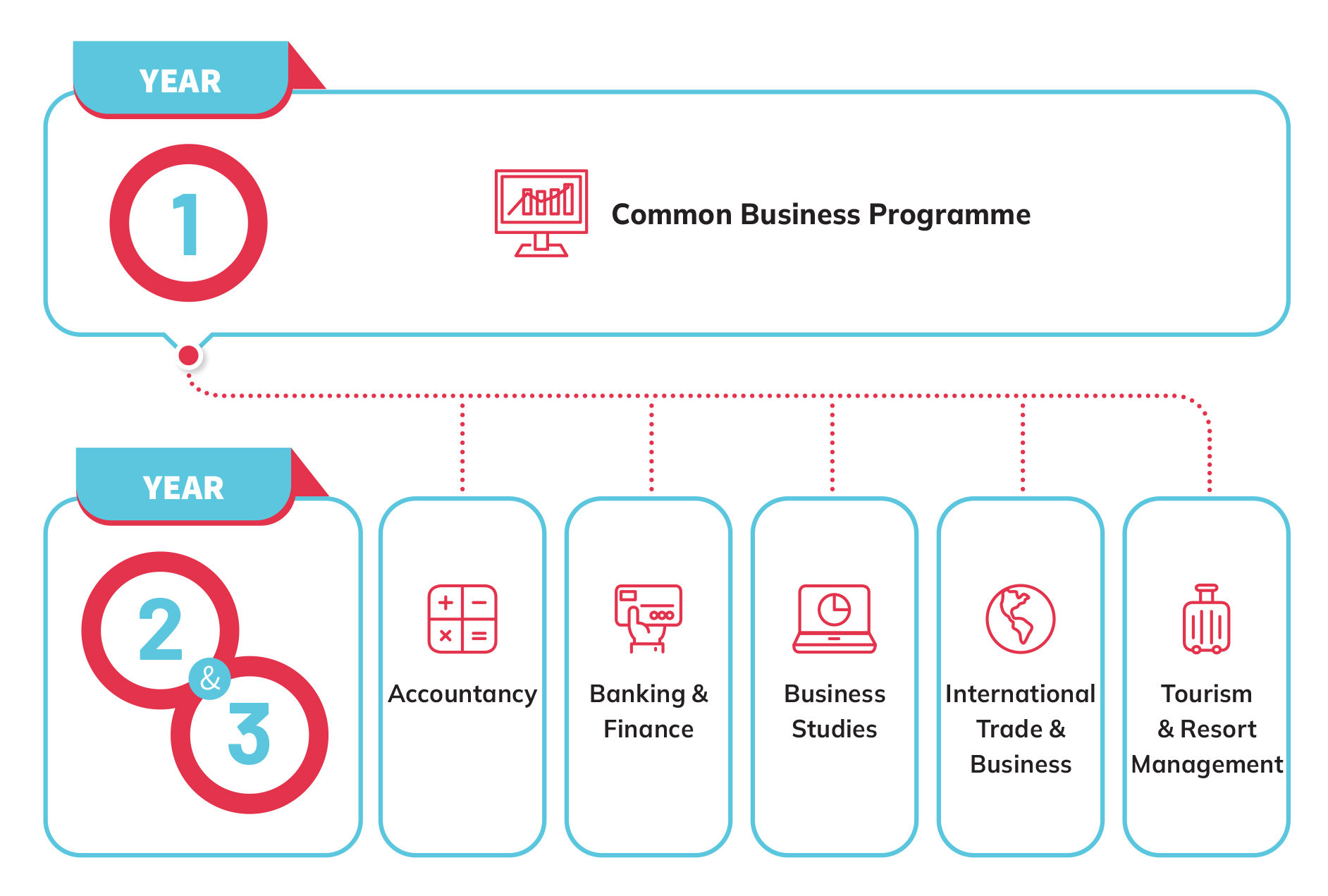Why CBP?
- Exciting industry-driven modules that build strong business fundamentals
- More time to explore options and discover interests before making an informed course choice
- No exams! Learn through a wide range of industry projects, real-world business cases, and simulation games
- Gateway to one of five sought-after business diplomas: Accountancy, Banking & Finance, Business Studies, International Trade & Business or Tourism & Resort Management
About CBP
Interested in pursuing business but unsure which course to choose? Our signature Common Business Programme (CBP) is the perfect starting point for you!
Through a series of curated foundation modules, insightful talks by industry experts, and interactive learning experiences, you will build a strong business foundation and explore exciting career options. This will help you decide which business diploma best fits your aspirations.
Get ready to ‘run’ your own business and see how different functions work together through an online business simulation game in the “Makings of a Business” module. You will learn to make data-driven decisions, solve problems, and manage day-to-day operations – essential skills for today’s fast-paced business world.
In the “Kickstart a Business” module, you will step into the shoes of an entrepreneur. Using the Lean methodology, widely applied in business today, you will develop appealing products or services and evaluate the success of your business idea.
At the end of this foundation year, you will be ready to choose from one of our 5 popular business diplomas:
- Accountancy
- Banking & Finance
- Business Studies
- International Trade & Business
- Tourism & Resort Management
All freshmen in BA share a common curriculum in the first year.
Overview of Your CBP Journey

Further Studies
Click here to view the Further Studies options for ACC
Click here to view the Further Studies options for BF
Click here to view the Further Studies options for BS
Click here to view the Further Studies options for ITB
Click here to view the Further Studies options for TRM
Careers
Click here to view the Career options for ACC
Click here to view the Career options for BF
Click here to view the Career options for BS
Click here to view the Career options for ITB
Click here to view the Career options for TRM
Entry Requirements
AGGREGATE TYPE ELR2B2-B
To be eligible for consideration, candidates must have the following GCE ‘O’ Level examination (or equivalent) results.
| Subject | 'O' Level Grade |
|---|---|
| English Language | 1-6 |
| Additional Mathematics/Mathematics | 1-6 |
| Any one of the 2nd group of Relevant Subjects for the ELR2B2-B Aggregate Type | 1-6 |
Applicants must also fulfil the aggregate computation requirements for the ELR2B2-B Aggregate Type ( English Language, 2 relevant subjects and 2 other best subjects) listed at www.np.edu.sg/docs/ELR2B2.pdf .
For students with other qualifications, please refer to the NP website for the entry requirements and admissions exercise period.
What You Will Learn
This module provides students with an understanding of the core principles of microeconomics and macroeconomics with an application of these concepts in real-world business scenarios. Topics include Demand and Supply, Price Elasticity, Market Structure, Gross Domestic Product, Unemployment, Inflation, Fiscal and Monetary policy.
Global Business (3 Credit Units)
This module provides students with fundamental knowledge of how the external business environment, consisting of country and industry level factors, affects the overall strategy, organisational structure and various internal functions of international businesses. Students will also discuss how contemporary world affairs, such as the impact of globalisation, terrorism, pandemics, emergence of economic powers in Asia and digitalisation present both opportunities and challenges to international businesses.
Makings of a Business (4 Credit Units)
Students will gain hands-on and real-world experience as they actively learn to integrate and apply knowledge and skills acquired in various modules to manage different types of businesses through game simulation. They will gain understanding of the inter-dependence of the different business functions, and to make data-driven decisions to address day-to-day operations of a business. They will also develop critical thinking and complex problem-solving skills as they analyse performance data and evaluate decisions to improve overall company performance.
Programming for Business (3 Credit Units)
This module provides students with fundamental programming concepts and best coding practices through the extensive use of in-class demonstrations and hands-on practices. Students will learn how technology functions by building digital solutions such as business applications and tasks automation by applying their programming skills. Students will learn how to problem solve through computational thinking.
Statistical Applications for Business (4 Credit Units)
This module introduces students to basic statistical concepts, tools and models. Students will learn how to organise and analyse data, as well as interpret results for decision-making in the business world. Students will apply and reinforce their learnings through data presentation and performing descriptive analysis on data generated from the Business Simulated Game.
Health & Wellness (1 Credit Unit)
This is a Level 1 Core module for all Year 1 students. The module will introduce students to the importance of maintaining both physical and mental health through the knowledge and monitoring of health indicators, and application through appropriate exercises. The aim of the module is to empower students with basic knowledge and skills to be independent and responsible in maintaining overall personal health.
Innovation Made Possible^ (3 Credit Units)
English Language Express* (Credit Units - NA)
English Language Express aims to give you a better grounding in the English Language and to strengthen the written and oral communications skills that you will need in your academic and professional careers. You will be engaged in writing, reading, listening and speaking activities that will develop your ability to speak and write grammatically, coherently and clearly. You will also hone your reading and listening comprehension skills.
* This module is only offered to students who are weaker in the English Language.
^ Critical Core modules account for 10 credit units of the diploma curriculum. They include modules in innovation and world issues, as well as an interdisciplinary project. By bringing students from diverse diplomas together, the interdisciplinary project fosters collaboration to explore and propose solutions for real-world problems. NP aims to develop students to be agile and self-directed learners, ready for the future workplace.
This module teaches students to effectively refine their written and spoken communication skills, discussion techniques, and people skills. Students will learn techniques to think on their feet to deliver an effective business pitch confidently. They will learn to persuasively communicate opportunities and ideas by creatively tailoring their business message for their target audience using storytelling techniques. Students will also develop their information literacy skills to craft clear business messages using APA style referencing.
Business Law (3 Credit Units)
This module provides students with an understanding of the basic knowledge of the law and its application in a business environment. Topics include the Singapore Legal System, Law of Contract, Law of Tort, Law of Agency/E-Commerce/Artificial Intelligence Law (E-Comm/AI Law), Law of Business Organisations, Introduction to Company Law and Intellectual Property Law. Students will also develop clarity of thought that requires a critical discerning eye and logical reasoning when applying legal principles to practical business decisions.
Kickstart a Business (4 Credit Units)
The module is designed for students to integrate and apply learning from the different modules to address real-world challenges provided by industry partners. Using the Lean methodology, students will build a Lean Canvas Model to develop and showcase a minimum viable product to address challenges and evaluate opportunities. They will learn about resource optimisation and value creation for businesses.
Finance & Accounting for Business (3 Credit Units)
The module imparts basic accounting and finance knowledge to students, in areas such as accounting equations, accounting principles, financial statements, ratio analysis, cash budgeting, short-term financing strategies, time value of money and capital investment analysis. Students will demonstrate their understanding by using financial software to interpret financial accounting information for decision-making in business environments when working on integrated project scenarios.
User-Centred Design for Business (3 Credit Units)
The module covers digital media design competencies with user-centered design principles. Students will learn to use design software and apply the design competencies on digital platforms such as web, mobile and desktop. Students will also learn to address digital design issues related to the user experience, presentation of the information, the imagery and the visualisation during their designing process.
Career & Professional Preparation (2 Credit Units)
This module supports students in their journey of self-discovery, character-building, NP values-inculcation, development of education and career goals via experiential activities and guided reflections with CPP coaches. To prepare them for their career and the future, students will also deepen their knowledge of the respective diploma curriculum and industries through learning journeys, mentorship and opportunities for interactions with alumni and industry practitioners. The module will incorporate a more comprehensive feedback and reflective approach from self, peers, tutors and the industry mentor to support students’ holistic growth and development.

